
Features | Lists
By The Staff
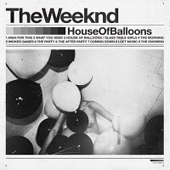
10 :: Weeknd
House of Balloons
(Self-released)
One thing that’s far too easy to forget about the Weeknd now that he’s been coasting on the success of two records and some Take Care cameos and a truly terrible Twitter feed all year is that at the beginning of 2011 his debut seemed to come literally out of nowhere, an improbable masterpiece materialized from the same thin air Drake breathes, which smells like cigarettes and sex and Ciroc and is maybe a tad stuffy. Freshness was central to the appeal of the Weeknd in the first place, which probably helps account for why Thursday faded from our collective consciousness so rapidly—proximity and similarity worked against Abel Tesfaye’s sophomore effort, casting it as nothing more than a redundant (if still mostly excellent) sequel.
The Weeknd still owe us the third part of their year’s promised trilogy, and even though it’s a few months late it’s still a perfectly good opportunity for Tesfaye to knock us on our skeptical asses once more. Or maybe Tesfaye will just totally jump the shark in a month; maybe he’ll just sign to a major and sell a billion copies of an overtly shitty studio album and tour the globe with Rick Ross or something. You never know.
But even if he does something irredeemably stupid, and even if in six months from now the name “Abel Tesfaye” will have about as much cultural cache as “Mack Maine,” we’ll still have the Weeknd’s brilliant, year-defining debut. House of Balloons is a great album. It’s worth remembering that, especially while the world the Weeknd’s designed for themselves begins collapsing all around us, crumbling into hype-cycle oblivion. It began with little more than murmurs—a few words tossed around about a handful of promising YouTube videos, the author of which nobody had heard of. The beginning of “What You Need” sounded like Burial. “Loft Music” sampled Beach House. Cynics muttered things: R&B for hipsters, or something. That was around this time last year, months before House of Balloons surfaced. But then there was after House of Balloons: Drake hyped them up, and suddenly this was R&B for Drake fans, and Drake fans are not (exclusively) hipsters. Drake ain’t low-profile. The point is that you will hear “High for This” on the radio.
Which is a good thing, of course, because “High for This” is better than most of what’s on the radio. And weird, which is crucial: rarely does a record as proudly fucked up as House of Balloons get radio play, and rarely does music as grimy and coke-addled and basically just icky get embraced by such a large cross-section of the western world’s music-listening population. How did this thing—this miasma of body sweat and after parties and cheap drugs—come to be the great critical unifier of 2011, the one record teenage girls and bearded hipsters and club DJs and pretty much our entire staff could agree is unreservedly awesome? We were galvanized by a guy who rhymes “and then we fuck faces” with the title of an Eddie Murphy comedy. This seems incredible to me.
At the same time, House of Balloons wears a major part of its appeal right on its sleeve, which might explain why it’s so easy to love: the thing just sounds amazing. Dom joked when reviewing the album that it was “RIYL: sound,” but there’s a funny sort of truth in that—this record is so immaculately produced that it’s hard to imagine anyone finding its most basic elements disagreeable. Are its thematic fixations morally repugnant? Yeah, almost comically so, and that can be enough to turn some listeners off. But how can you argue against those surfaces? What Doc McKinney and Illangelo have crafted here is uniformly gorgeous, an uber-contemporary fusion of R&B and…well, everything else, from dubstep straight through to indie rock, and the result sounds staggeringly good. I suppose on the inside Tesfaye is ugly, but House of Balloons is beautiful. The whole thing might be as simple as that.
Calum Marsh

9 :: Tim Hecker
Ravedeath, 1972
(Kranky)
“Hatred of Music.” There may not have been a more appropriately tongue-in-cheek summation of the 2011 spirit than the title to the glowing two-part centerpiece of Tim Hecker’s wonderfully nihilistic Ravedeath, 1972. As we find ourselves here at year’s end seeking a definition of the year’s character, it becomes as difficult as ever to place a particular importance on any specific culprit. In 2011, it doesn’t feel fair. We’re supposed to get it now, no more surprises; this year, predictions for developments in musical careers simply became contests to imagine the most absurd turn of events or the most unimaginably silly collaborations. In 2011, we were jaded, and Tim Hecker was there with us to turn those endless trashy thoughts into something tolerable. On second thought, that’s not enough: he was there to turn them into something worthwhile.
Maybe that’s a cop-out assumption, but in deeper consideration it feels truly appropriate to say that this year was more about the cartoonish, anything-and-I-mean-anything-goes character of the mixture as a whole. It was about the overwhelming near-absurdity of a musical casserole that begged at every turn, under threat of realizing our fears, not to be defined by any advisable expectations whatsoever, than it was about any distinct style or brand. I hate to say it, but I know Tim is there with me: in 2011, we absolutely loved to anticipate, and to bear witness of course, to just how far down the bottom of the barrel went. The clownish digressions of Jack White and Co.? Rebecca Black? Fucking Lulu?! It was all a little too much to handle without some defensive cynicism. And in its graceful sympathy Ravedeath, 1972 made me realize that pessimism can be transcendent. In 2011, Tim and I wallowed, and it was glorious.
Unassuming at first glance, as is characteristic of Hecker’s subtle destructions, Ravedeath, 1972 rests deeper in a miasmic fog than anything Hecker’s produced to date. And it’s that distance that he seems to feel from the idea of music itself, the need to reach through a heavy curtain of obfuscating detritus, that makes Ravedeath, 1972 a unique entry in Hecker’s catalogue and an incomparable commentary on what it takes to be a listener in 2011. It finds new success in the visceral density for which he’s long been known by incorporating a host of field recordings, and by focusing on the range of a particular instrument—notably a monstrous pipe organ—to give the record a concise conceptual character and unified feel. A cover graced by the infamous MIT “piano drop,” as well as interviews that find Hecker recalling images of mountains of physical music media becoming landfill fodder and bonfire fuel, have made it clear that the Montreal producer is still wrestling with his own sense of refuse and repurpose, though, and if any record gave me hope that I’d make it out of the noise and excess of this year’s circus with at least some dignity intact, it was Ravedeath, 1972. In 2011, I survived, and I’ve got Hecker to thank.
P.M. Goerner

8 :: .L.W.H.
The Tape Hiss Hooligan
(Green Ova Underground)
Let’s begin with the brilliance of the third track, “Sound Uv Murda.” For a minute you think the guy is on drugs, and if he is, well, you want those drugs. You know intuitively—you do not bat an oxygen-deprived eyelid—that “Sound Uv Murda” is on some sick, almost reassuringly-deranged tip. Its bowel-sounds say so much, until you realize that those deep sonar uplifts making your earbuds shiver aren’t bowel sounds at all: you are listening to the sound of music. It is a truly strange sound, full of chubby-sounding synths and noisy fly-mimicking percussion. It sounds like your ears have been IV’d into bags full of hard opiates.
The Tape Hiss Hooligan, as a whole, then, is proof that whatever’s in L.W. Hodge’s mental IV drip seems to be working. No other album of beats this year—and there were many good ones—suggested so much breadth and untapped potential, the sense that behind all the badly-mutilated industrial drones and homilies to alienation/the Blade Runner soundtrack there existed someone with enough flair and unsimulated humour to push this sound where it’s rarely been before: that is, the personal. Eschewing the specifically complex and embracing, instead, a more holistic model of tearing shit up to a funky beat, L.W.H. says fuck it, pretty much at the outset, to all the old spare parts that another producer might choke on, or embellish out of hand. He says fuck it; then he invokes Max Von Sydow to deliver some moody shit for the introduction to this, his debut album.
His M.O. is all about buzzes and articulatory hisses. Dude is not interested in testing the elasticity of your patience; he sure as hell is not interested in just making your neck snap forward. If he were, “Bobblehead,” with its discreet cop from Chrono Trigger, would end the moment its beat drops. Hence, forthwith, its beat never does drop, or at least not terminally—re-issuing itself with slight modifications each time the game-loop clears, so that the song, invested in subverting its own depths, seems kinda fucking eternal. (Of course it’s actually only two minutes long.) The rest of the record follows suit in sounding so alive—perishably so. It’s an album designed around Hodge’s brain, and it’s as if his memory’s beholden to pretty much everything synchronized. Peel back his forehead to find a brain topographed like a loudspeaker’s unvoiced insides, with all the synapses lit; a talented rap crew loiters in dude’s gold-rimmed mouth, inspired by the gusts of whatever it is this man’s head is enabling. It just sounds really fucking cool.
Even the more base-level tracks here—a bleary-eyed Squadda B tears out the house to apply himself, or something, in the boom-bap revivalism of “Oakland State of Mind”—snap back to the album’s skewed reality at each bar’s end. (Those snares on “Oakland,” and the similarly louche percussion on “Zoney’s Island,” are made, somewhat, to sound like instruments of warfare.) Nothing is predictable, yet everything sounds natural and grounded. The cloud-rap apotheosis that is the beat to “All in Your Hands,” for instance, whilst sounding (vaguely) like a digitized cloud of smoke meeting a cell-phone signal in a drug-dealer’s house (sirens swishing in the background), is quick to assert itself as a motivational call-to-arms via some hard-talking verses from the Main Attrakionz and Shady Blaze. The whole Green Ova Undergrounds crew outstrip themselves here: there’s an argument to be made for Tape Hiss being the showcase for this particular scene and these particular people, at least right now, when they all sound so hungry and so indebted to the art of egging one another on. And what beats! Shady, especially, goes mental on these tracks. On the aforementioned “Sound Uv Murda,” he delivers his lines in a double-time strobe. Elsewhere he sounds like my computer’s text-to-speech software when it’s having a massive stroke—but it’s a cool, extra-robotic kind of stroke that makes sense, in a way, once it’s paired with beats as huge and disorientating as the inestimable “Bitin’ and Shakin’” (whose melodic ripples, along with another scene-stealing guest-spot from Tink, make it a clear runner for song of the year).
There is nothing surplus on The Tape Hiss Hooligan, but it is stuffed. At a short forty minutes, it still feels inexhaustible, endlessly re-playable. L.W.H.‘s debut album is like a repository of what’s currently vital, reconstituted into something that moves in newly weird and electrifying ways.
Alan Baban

7 :: tUnE-yArDs
w h o k i l l
(4AD)
“Would you call me an idealist if I told you I am disheartened that in this day and age I do not have more male black friends?” That’s just one example of the genius of w h o k i l l: Merill Garbus is self-interrogating, but her observations—which often are rendered (deceptively) simplistically, like philosophical tweets—connect her own politics, anxieties, and desires to the sheer complexity of modern American society. In fact, Garbus so clearly understands and effortlessly expresses this fundamental interrelationship between personal desires and national politics that every half-assed politico (and I include Bob Dylan in this statement) should be super jealous of w h o k i l l‘s simple power; Garbus’ willingness to place herself at the center of her critique means she’s not just an observer, but an active participant in the maintenance of the twin problems of inequality and privilege as well as the problem of finding a solution.
So while a statement like “if nothing of this is ours how will I ever know if something’s mine?” may be an explicit indictment of capitalism, Garbus can go deeper: if “ours” is a fiction, then maybe “American” or “America” or “mine” is, too. Guided by this idea, w h o k i l l becomes an acute attack on the shared cultural assumptions that moor the privilege enjoyed by the American middle class. Garbus imagines herself as a “Killa,” a “woman who kills”; this is her strategy of resistance. This enormous, dense, brilliant, sustained critique is parceled out in songs that superficially approach self-contained ideas—gender (“Killa”), the body (“Es So”), race (“Gangsta”), inequality (“My Country”), sex (“Powa”), protest (“Riotriot”), and personal identity (every song)—but all of this stuff is interrelated, and the album makes that clear, over and over, with the ease of a pop up book and the weight of several intellectual monographs. So: rendered in text speak, bold and scathing in execution, and willing to admit culpability? This kind of conceptual weight takes work—like, a lot of work—and it’s kind of astonishing how easy Garbus has made it seem.
But the other thing that makes w h o k i l l amazing is that Garbus has lodged her revolutionary tank inside cotton candy, offering the most entertaining, gorgeous, ebullient deconstruction of American political, social, and cultural ills we might imagine. I don’t think it’s an exaggeration to claim that, alongside being the most scathing album of the year, w h o k i l l is also the funnest, funniest, most charming one. This kind of masterful synergy—a penchant for meaning, a fascination for the studio, and the ability to write really damn good songs besides—makes it hard not to assume that every choice on the album—every edit, splice, lyric, phrasing, articulation, and mistake—was made consciously. Much of this is cheery, effervescent art-pop, but all those moments throughout the album where the music sounds like it is falling apart? The free improv underlays? The collage deterioration? The staccato audio pans? The parts where instruments jarringly drop out or she fucks up a vocal line? The fact that at various points the music that isn’t explicitly fucked up still sounds slightly off?
There’s three ways to read Garbus’ mish mash of pop, studio trickery, and politics, I think, and they aren’t mutually exclusive. First, the production uses song structure as a stand in for the dominant social order, and all of these blemishes reflect the frayed endings, sink holes, and rotting institutions Garbus sees dotting the American landscape. Second, on a personal level, these blemishes reflect the imperfect nature of seeing one’s self clearly. Which—especially if you’re white, which Garbus acknowledges throughout—is the problem at the heart of tackling such large issues, because despite all the threads that connect these issues it’s extremely hard to focus on the big picture, or to situate your own privilege within it (though, thankfully, Garbus also acknowledges just how privileged it is to get to worry about privilege). But so every time Garbus seems to be approaching a broader conclusion the music stutters like a Flash buffer, just as her rearticulation of “women who kill” is both powerful and powerfully conflicted: she is simply and humbly admitting that the problem is too large for one voice to fully explain.
A third possible reading is my favorite, though. Garbus, having admitted she can’t solve America, still embraces it, composing songs with a series of vaguely-jingoist, patriotic, Yankee Doodle melodies. I like to imagine that the sheer ebullience of most of w h o k i l l is intended to represent the simple beauty of the shared values American culture purports to represent, because despite their unattainability Garbus still believes in these ideas. w h o k i l l‘s blemishes, therefore, are the recent recession, the partisan bullshit, widespread social inequality, and gender and racial imbalance eating away at the simple joy of cultural expression. Garbus can’t erase the problems that beset American culture—she knows this—but neither is w h o k i l l simply plugging a flower in a gun barrel. This is Garbus’ vision of what America actually means, or what it means to be American. What it looks like. What it sounds like. It’s a plumb line for new architecture; it’s the fiction made real; it’s art escaping from a vacuum of decay to show a better version of the world. And since that’s the biggest solution one person can offer, it’s really pretty beautiful.
Mark Abraham
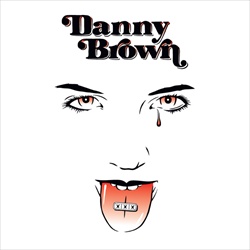
6 :: Danny Brown
XXX
(Fool's Gold)
Sing it with me: “Take it off baby, bend over, lemme see it / If you lookin’ for a real pussy eater, I’ma be it!” The depravity of XXX hits a fever pitch with a gleeful, three-minute description of what, precisely and lasciviously, Danny Brown will do to you when you show him your pussy. “I Will”—gross, happy, fluids everywhere—might be the only time XXX‘s enthusiasm isn’t underscored with anger and sadness. Brown finds all other means of meliorating his self-loathing—PBRs, handfuls of adderall, blunt after blunt after blunt—insufficient. He needs you (“bitch”) to sit on his face.
XXX is, in a lot of ways, about needs. The need to rap, the need to succeed at rapping, the need to get fucked up to forget about failure, the way getting fucked up confuses one’s needs to the point that getting fucked up becomes a need independent of and more urgent than any other. So yeah: muff diving as therapy. It’s a backwards concept, but Danny Brown is a backwards rapper, an upside down rapper, a rapper inside-out with arteries belching smoke. He knows all of this—he’s “a smart nigga that do dumb shit”—but he illustrates in his rhymes how vast a canyon exists between consciousness of one’s flaws and the act of self-renovation. So, he bemoans his self-made plight (“DNA,” “30”) even as he excavates himself a deeper trench of despair (“Bruiser Brigade,” “Die Like a Rockstar”). He drinks until he throws up; bile and half-digested hot dogs coat adjacent women, rappers, and his skinny jeans.
If what he describes in his bars is sometimes ugly and hateful, the bars themselves are fluorescent. The bleakness of XXX, for the majority of its runtime, is a springboard for some of the most hilarious, language-drunk verses of the year. Brown fronts like he’s getting Kanye money before shattering the facade “Y’know that I be frontin’ / Got that income tax swag, that income tax swag / That bad dame in my lap just copped her a bag,” then cackles at the genteel activities of the affluent: “You gay niggas up in the pubs; they watchin’ them soccer games / We drunk as fuck, nigga; we bumpin’ Waka Flame (BA-BA-BA-BOW)!” Innumerable funny, sharp insights bloom from Danny Brown’s arid core of confused antipathy like flowers from a cactus. Real talk: XXX is such a fun record—it’s just that, like most real-life fun, the rush comes with some rather thick strings attached. You can’t numb the self-hatred and despondency that bleeds from the record’s last third with a glass of Kool-Aid and a couple episodes of How I Met Your Mother. You never leave the house; you don’t sleep for three days. You pop pills, write, drink, and smoke haze. You tell some woman for whom you have an unspeakable disdain—an extension of your own disdain, really—to strip down, and you fuck her until you’re both too exhausted to confront reality. Or you probably don’t do these things, but Danny Brown does. Then he documents them in gleaming tongues. What you won’t do, bitch he will.
Colin McGowan
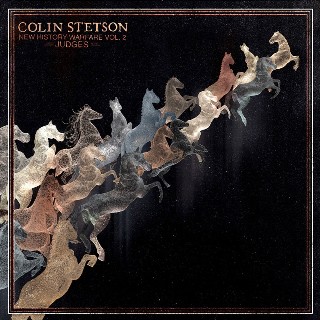
5 :: Colin Stetson
New History Warfare Vol. 2: Judges
(Constellation)
Welcome to wordy song titles, circular breathing, and the hair on the back of your neck standing upright and then walking down your spine; welcome to the sublimation of possible pretentiousness to an undeniable effect and purpose; welcome to your new favorite one-man band. It’s not a debut but it might as well be, so much more fully realized is the aesthetic, so definite the leap from Canadian session musician and touring back-up performer to a capital-I Identity, to a record that stands tall on the shoulders of its scant precedents and reaches for something rarely reached for. On New History Warfare Vol. 2: Judges Colin Stetson is just one ballsy, virtuosic dude with a bass saxophone mic’d twenty ways to Tuesday. The clack of the keys becomes percussion, melodic exhales are emphasized like a tongue-less Thom Yorke wailing from within a brass cell, and the noises caught by the most intimate mics often sound like lightsabers bleeding.
Judges was recorded entirely in single live takes with no looping and no overdubs, and aside from a few guest vocalists it is all Stetson and his horn. That’s not impressive just because. That’s impressive because knowing that and listening to this record is like witnessing musical clairvoyance or like hearing an artist craft his work through reverse-engineering and doing so because that is the only method by which the desired results can be achieved. Stetson knows exactly what the music should be and he knows exactly how to achieve that through everything that he and his instrument and his microphones will be doing in the process of playing and capturing, really, just one part. And yet there are a couple dozen parts involved in the mechanical operating of that one part; concurrently revealing those parts as beautiful has a lot to do with Stetson’s positioning of self, positioning of his medium, and positioning of its reception. His technical statement with Judges is a profound one: instrumental music can be as much about the artist’s awareness as it can be the actual performing. What’s more, Stetson’s M.O. is the epitome of minimalism and yet the form it takes is often maximalist, somehow erasing the gap between those diametric opposites. This record eats conceptual importance for breakfast.
There’s a track here that’s titled, perhaps somewhat ironically, “From No Part of Me Could I Summon a Voice.” It sounds like a freakin’ orchestra on speed. On the flip side Stetson achieves a supreme musicality and weighty resonance out of basically holding key for Shara Worden’s soul-rending lead vocal on “Lord I Just Can’t Keep From Crying Sometimes,” Stetson’s eerie inhales used as the only hint of rhythm needed. The implement may be singular but the landscape painted—in contour and canonical reference—is vast. Intro “Awake on Foreign Shores” appropriately mimics a foghorn before it is transmuted into what could be a loop of Bartok. “Judges” could be a Radiohead jam, “All the Days I’ve Missed You” could be John Williams or Thomas Newman, there’s two or three tracks that could be Philip Glass or Desplat, “Red Horse (Judges II)” could be good Reznor—the inaccessible is made accessible and vice versa, for all of this is perfectly unified by one man with his one instrument doing incredible, daring things. He uses that instrument to so many different ends and yet it is one end; there are so many different sounds present and yet it is really just one sound. And in this context the album’s otherwise obfuscated themes about personal alienation, about the criminality of war, about the intolerable weight of sorrow, about death as a dressing of life, about the inherent worth of righteousness even if its efforts are futile, about the ultimate synonymity of love and justice…all rendered in crystalline, irreducible clarity. So much to say and Stetson can’t “Summon a Voice”? On Judges he doesn’t need to; he need only breathe through an extension of himself and then carefully place the listeners inside that breath. So much to say but all it takes, for Stetson, is a sigh.
Chet Betz
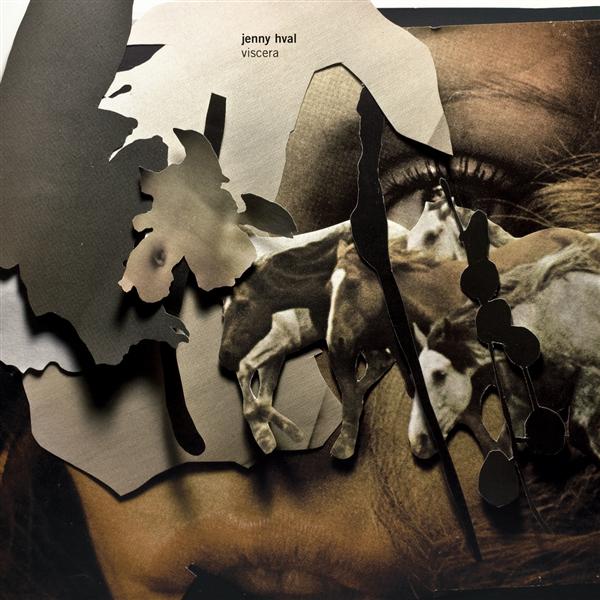
4 :: Jenny Hval
Viscera
(Rune Grammofon)
I’ve always been fascinated by the body as an academic pursuit, but having spent 2011 recovering from the surgery required to remove a benign Hemanginoma tumor from my spine I’ve had a far more intimate experience with my own body this past year. “I came back with a broken spine.” Pain, sure, and aches and stiffness, but also how peeing is affected, say, by losing a half inch of height. Or the strange knot I have just below my left breast that is probably the result of a severed nerve. Or the drowsy pleasure of Morphine, Fentanyl, Oxycodone, and Codeine. What it’s like to wake up after a twelve hour surgery in a room you’ve never seen before, your face puffy as fuck, “from my veins…a strange itching,” and, seeing the mixture of relief and concern on loved ones’ faces, your own reaction is basically, “so…how was everyone’s day?” Or how my legs, which stopped working last November, are working now, but still kind of feel like I can’t quite totally feel them working. Or how a rib that was removed in surgery affects my posture. “Tried yoga. Couldn’t do yoga.” Even simple things, like how many times I’ll have to readjust my back while writing this blurb, or how I hope the dog doesn’t wander off with mischief in mind because it takes me a full ten seconds to get off the couch and stand erect. Which…doesn’t seem like a lot of time, I know, but count how many seconds it takes those of you who haven’t had major spine surgery to get up. People ask me how I am, and I say “basically normal,” but it’s hard to explain what “basically normal” is exactly like.Viscera obviously isn’t about my body, but bodies are its preoccupation, both because Hval’s lyrics focus on them and because her songs are sewn together like thick, out of order mannequin parts. These are sinewy tracks; they have a bend to them; they are littered with synecdoches and metonyms for ineffable truths that are only meaningful to individuals: “my humming is my own.” When Hval says “we share thighs but not languages,” she cuts to the carnality that unites all humans across the socially constructed boxes we’ve constructed for each other. But this carnality, teeth and all, shouldn’t be mistaken simply for sex; it’s true that Hval opens the album with a line about stimulating her clitoris with an electric toothbrush, but the imagery is just as much about robots and organisms as it is about rubbing and orgasm—it’s about the frailty of the body as an engine as much as it is about training ourselves to experience the pleasure our bodies can provide. Which is not to take away from Hval’s wielded sexuality—this album is feminist, and the reactions her frankness has gotten in some quarters suggests female sexuality is still strangely knotty for certain parties—but is simply to say that it isn’t only feminist, or only concerned with women. It’s an album about how our bodies share languages, waste, and direction; it’s only how we interpret these things that is our own. It’s focused on internal synapses, and not external signifiers. “The body is a one-way street.” “The body remembers.” “This is where I come from.” All true; all universal; all pointing to the way we physically experience the shit our brain organizes and unveils for us. ‘Cause we’re all still basically babies, or like the dog sitting next to me; running off to chew things is the first way we experience the world, and speech, in the world of Viscera, an album so fascinated with passing things mouth to mouth, is merely an evolution of that action.
It’s easy to get caught up in the poetics, I think, because for all the jaw drops at Hval’s vagina dentata reference her actual lyricism is quite restrained. It’s vague enough for us to take our own meanings from it (the title track, for example, seems to perfectly describe my painful week immediately after my surgery, trying but failing to talk eloquently about anything), but just pointed enough to make a simple case for the validity of the body as an organizing principle for humanity. But what makes Viscera an Album of the year and not just a Collection of Poems Set to Music of the year is the way Hval and her bandmates and producer (Supersilent’s Deathprod) take the body as a point of departure for song construction: there are no real verses or choruses on Viscera, because an elbow isn’t a chorus. Hval instead speaks “body and bone,” tracing the “wet line” of spines and ribs and hair through her music.
It’s not surprising, maybe, that her aesthetic is partially a marriage of maritime-ish folk and industrial noise: this is an album about traveling the body, and the ships and trains that connect our organs and joints are wet and rigid. It’s kind of astonishing how confident this aesthetic is, actually. We could point to stylistic touchstones—folk gods like Tim Buckley, Joni Mitchell, Kate Bush, Mary Margarent O’Hara, Fairport Convention, and the McGarrigles—but the weight of the music is Hval’s own. It’s expansive, enveloping; it feels modeled on the way a body falls at rest, the arrangements fixating on pores, wayward hairs, fingernails, and sleep dirt. The songs start at the fingers and toes with simple guitar plucks but the music soars as we crest shoulders and thighs and get a clear view of the landscape. Seaweed, oceans, trains, fingers, hands, and ribs. Things that connect and things that entangle. Sex isn’t just sex; it’s another way our bodies speak to one another. Breast milk isn’t just marrow; it’s veins and words and secrets. It’s all shit that binds us together, is the overwhelming message. We can speak to one another when we choose, but Viscera is beautiful in its recognition that our bodies constantly are.
Mark Abraham
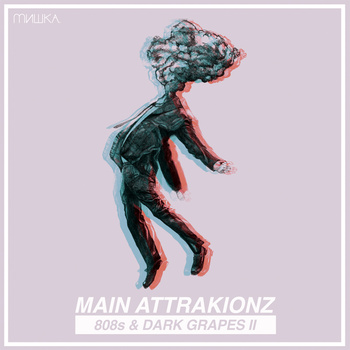
3 :: Main Attrakionz
808s & Dark Grapes II
(Mishka/Green Ova Underground)
808s & Dark Grapes II isn’t, exactly, a universal record, but it’s close. I know people who love hip-hop who don’t love this; I don’t understand these people. What I don’t understand is how this record isn’t morbidly intoxicating, how it isn’t received and understood and embraced as a hip-hop statement that isn’t the sum of its parts, but is instead a matrix whose checked pock marks detail, as a sum, all that is wonderful about hip-hop. Dark Grapes II is trenchant with sonic wealth, lush and considered, sometimes flippant, but mostly utterly ravaged by its own girth. Isn’t this what we’re looking for outside of the most stereotypical places we encounter music like this? Could “Perfect Skies” be less mellifluous, less gregarious in its total commitment to the visceral sound of repetition, of pop and funk and R&B—of dream-everything? Could “Diamond of God” perfectly—an adjective and adverb encountered so often throughout this record—picture any less the crossroads the modern emcee faces between the licentious mainstream and the thankless, even rigid underground? Do you call the woman who won’t give you head, or do you hate yourself for not automatically having an answer? Do you call the man who will, or do you hate yourself for assuming men are indelibly such animals? Are you a Bossalini or Fooliyone? In the depths of that song I often think: I am “a real real real real real fool nigga.” But no one would ever call me that. Which I do understand.
It’s a sequel, though it doesn’t feel like one. Sequels are fickle beasts; sequels beg for precedent but equally beg to be understood on their own terms. This new opus from Main Attrakionz doesn’t work that way. What MondreM.A.N. and Squadda Bambino have released—for free—is something else, like an alternate universe sequel, like Dark Grapes I happened somewhere else, somewhere we’ll never ever find, and the duo carried the next generation into this world for us to inspect. Because there was a vacuum here and they’ve filled it. It has no upped stakes, no surprise cameos, no sudden blockbuster shine; what it does have is almost preternatural: a fully formed statement of aesthetic, intent, and intellect from two young emcee/producers with a taste and talent for hip-hop that surpasses what any of us should—if we harbor such expectations—be receiving from such green artists. This is, to put it lightly, more than we deserve.
And right: green. Like the all-consuming everything-ness of the record, “green” calibrates the trajectory of the label they run (Green Ova Undergrounds, a young Bay collective brewed, dewily and freshly, from almost nowhere, a label which they both define and represent, this album the undoubtedly best they have to offer) as well as the trope that casts them forward. “Vegetables,” frankly, is all green: like an organic “A Milli,” its beat is pristine vocal euphony, little else—or all else—and like one of mainstream hip-hop’s most successful emcees, the words that furnish the beat (or wholly grow it) represent the money that both motivates and enables the song to exist at all. But there’s more; there’s more to the repeated chants of “vegetables / broccoli / lettuce” than just their clever euphemisms for cash, or weed, or industry, like maybe the implication that eating one’s vegetables—a commodity, no matter who you are, for any person struggling on both sides of the poverty line—is as important as allowing one’s creative limbs, phantom though they may be, requisite exercise.
Exercise, after all, is capitulation: to routine, to restraint, to the ever-swarming pall of death. I have trouble believing that when any rapper—notably, this year, Lil Wayne or Young Money protégé Tyga or Freddie Gibbs or even Danny Brown—declares his or her intentions to live each day as if it’s his or her last, the good lot of them aren’t absolutely terrified of dying. But when I hear Squadda revel in finally having money in the bank while pimping his solo record come November (which never came out in November, FYI) yet lamenting his already young and spent life at fucking 20 years old, I can’t help the deep chiropractic snap I feel at sensing an artist take responsibility for his lifestyle—and not just the drugs he does or the liquor he drinks or the venereal diseases he willy-nilly exposes himself to, but the life he was born into, which, like it or not, he still takes responsibility for. Which he does over a surprise saxophone that automatically trumps whatever Destroyer slinks around. It’s so awesome, so beautiful, and it’s humbling in ways hip-hop rarely is; it’s a blunt affirmation of exercise and practice and devotion hip-hop rarely divulges. It is, in so many sad ways, green. And it’s everything I’ve ever wanted out of a mixtape, let alone one I found for free online.
Dom Sinacola

2 :: Braids
Native Speaker
(Flemish Eye/Kanine)
I’m not one for the sacrifice story. After all, this is music. If you’ve decided to have a go at it then you’re asked as a matter of course to sacrifice, whether that’s working a shitty job to make ends meet or selling CDs out of a van. So when I hear that these four best friends played in the high school band together, skipped university, spent a winter writing, moved from Calgary to Montreal, and only then started the painstakingly long process of designing and recording what would become Native Speaker, it’s not necessarily that they sacrificed that I think should be recognized. That sacrifice isn’t the story; what is is that there’s a reason why there aren’t more albums so perfectly devised. Its long gestating yield makes Native Speaker much more permanent than 2011’s fleeting trends; its lengthy development is clearly evident while listening to its completely immersive aesthetic and lyrical experience.
When it first landed, a few of the CMG staff said Native Speaker sounded like Animal Collective with a woman singer, and that very first of what turns out to be dozens of impressions as this album unfolds is probably fair. But to end the discussion there would border on the criminal. The record does look to contemporary trends in the sense that it blends texture and repetitive rhythms, evoking a cerebral groove that is evident on many albums that dot the last few years’ worth of year-end material. But what distinguishes this album is the degree of its careful construction. These songs are not comprised of one worthwhile idea at the center of some swirling noise or psychedelic freak-out, distended and stretched with intros and outros of ambient wash. Every second of each song feels essential and intentional to a narrative build; each moment establishes a background to later be elaborated on, or to be refuted by an upcoming movement. That’s why the suggestion that Braids might have simply produced something similar to, say, Merriweather Post Pavilion (2009) is unfair: Native Speaker is actually a better album than that.
I make that claim not simply based on Native Speaker‘s pristine construction, though I can’t think of a more flawlessly conceived and performed work of music in indie rock today. But where Animal Collective’s lyrics tend towards some lukewarm collection of stoner epiphanies, Braids vocalist Raphaelle Standell-Preston displays the same careful consideration in her expository, confessional lyrics as the band does in its arrangements. In a Guardian interview, Standell-Preston says ““I think I learned how to love with Native Speaker. I guess I learnt how to respect myself and how to respect somebody else.” Now, make no mistake, these are songs that are sometimes about fucking, and being fucked, and being fucked over, and the resonant emotional core of those events. But that doesn’t mean that it’s crass or flippant; rather, it’s Standell-Preston writing circles around sensuality. When she sings about, on the album’s title track, touching and loving, and the song swirls, and coalesces, and crescendos beautifully, climaxing (word used intentionally) with something as brutally honest as “I’m having you inside me / Oh you are my native speaker,” I’m reminded of the quote, “A poem conveys not a message so much as the provenance of a message, an advent of sense.” Native Speaker‘s manifest patience, intimacy, and consummate honesty is critical, because this record is about the onset of a universal, and yet somehow deeply personal, sense of adulthood.
It also needs to be said: the amount of respect this band has for their audience is clear, and not only in the fearless lyrics. Here’s another telling quote from that same interview, this time from drummer Austin Tufts: “We always remind ourselves before we go on to play with intent and conviction and restraint. Because these songs are really emotionally charged, it’s easy to forget about restraint when you’re playing.” How refreshing is that? Here’s an album so unapologetically about love made by a band with such resolve to remain formally and technically cohesive? A band that wants to remember the audience in one’s equation, rather than to privilege the purview of the artist to do pretty much whatever they want? How rare is it to hear a musician comport themselves with professionalism and to not have that denote some intentional distancing from the audience? What I hear is an album that is totally generous, without ego or pretension, and faithful to the traditional precepts of this thing we call art and yet often mistake for “cool.”
There’s another quote about poetry that goes, “The poem is the point at which our strength gave out.” I like what that says about the impetus to spend months and months making an album like this, with no clear indication of what will come of it, simply because there’s no other way to explore these topics than through a careful assembly with close friends and collaborators. Native Speaker is unique because it simply would not have been possible without the conditions of intimacy, skill, and yes, sacrifice, that went into making it. There may have been albums this year that touched on some impermanent sense of the day in a fumbling, accidental way, and those are important to write about too. But Braids are one of the few indie rock bands I consider to have created an inimitable work of art in 2011.
Conrad Amenta

1 :: Shabazz Palaces
Black Up
(Sub Pop)
Ishmael Butler—aka Digable Planets’ Butterfly, Cherrywine’s Ishe, and Shabazz Palaces’ Palaceer Lazaro—is a hard dude to pin down. He wouldn’t savor such talk. Since Shabazz Palaces, his duo with multi-instrumentalist Tendair Maraire, first made rumblings with a pair of EPs in 2010, they’ve shunned interviews, social media, and much of the general bullshit that keeps the cogs of the Internet churning. When Pitchfork came knocking for an interview last year, Butler was all, “I dunno—why don’t you write a review?” The emphasis has remained squarely, almost uncomfortably, on the music: fractious and diffuse, its only nod toward a proverbial rap origin story the handful of places where he references being from outerspace. Which is not, at least critically, super helpful. The music sits there, blankly absorbing our interest, not budging an inch.
But the tribe of Shabazz were journeyers—the name is rich with history—and so, too, is Butler. His status as one of hip-hop’s great career musicians neatly inverts Q-Tip’s: as unheralded as Tip is heralded, they both emerged from the riotous jazz explosion of early-‘90s New York; both watched as the groups they led dissolved; both retreated into wonky millennial R&B experiments; and have both emerged, years later, as leaders of sorts, Tip a thinking man’s populist and Butler the stolid deconstructionist iconoclast. Reference points put us on steadier ground still: these are the polyrhythmic synth skitters that Timbaland shied away from fully exploring; this is the fusion with beat and voice and structure that New Amerykah (2008) defined; this is that cramped spot between cavernous low-end and cacophonous high-end in which Dizzee Rascal first plied his desparate trade.
But upon contact, all this careful context dissolves. When Lazaro insists that we “Clear some space out / So we can space out,” amidst the eternal midnight coos of “Recollections of the wraith,” is he talking about the tyranny of the physical world, or is he literally consulting a club owner? (Neither would conflict with the blissful boom-bap of the track, or the exultant proclamation: “Tonight!”) Amid a thrush of drums, we pick up phrases from “yeah you” of “pink throats” and “played out riddles,” that, when we dive deeper, appear to be the components of a straightforward diss rap. (To dispel any confusion, Lazaro drops the beat out and iterates: “You corny, nigga.”) Is this deflating or reassuring?
The point, of course, is neither, and both—the shifting distance between the infinite and tonight. That distance is the subject. Butler’s concern is not the cosmos or the nebulous emcees he clowns but hip-hop’s ability to conflate that gap; this is why he talks about entering a party as if reading from an ancient tome, about getting laid as if the universe were getting laid through him. Indeed, Butler’s understanding of blank space is absolute. Black Up is an artwork arrived at by subtraction, like Fumito Ueda’s barren, sun-spackled vistas or Emeralds’ room-filling bloom. Palaceer Lazaro says only what he has to, meaning dripping from each word; the bass hits only where it needs to, samples gripping tightly. And after all this subtraction, what’s left? Moments we’ll never shake: the synth-riddled drop on “Are you … Can you … Were you?”; the hollow plucks of the mbira halfway through “An echo from the hosts”; every boozy melancholic moment of “Recollections of the wraith.”
These moments, then, are what we’ll hang onto. Butler’s refusal to provide insight to his music makes him a man apart, particularly from we eager rumor-mongers and typists, but that’s okay. Because although his artwork stands outside of the cesspool of Twitter and the gnattering of the Internet, it does not stand against it—because then, of course, he’d be as much a part of it as anything else, sucked into its whirlpool of invective and apathy. This remove is unique. Hip-hop’s great figures—of which we may count Butler—have taken us for granted of late. We have indulged their twisted fantasies and swept their throne rooms, absorbed their mixtapes at the speed of thought and promulgated compulsively thereupon. But Butler asks nothing of us. In a decade, when we look back at this strange second golden age of rap we’re living through, this album will stand as no monument for us to gather around. It will be, then as it is now, Ishmael Butler’s adytum, walled off from us all—a model for hip-hop that is not about its creators but for them.





